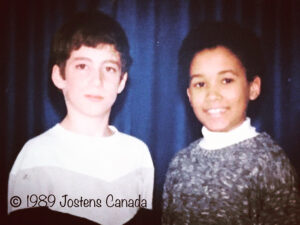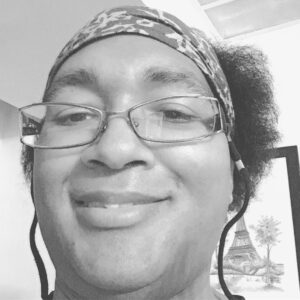Several years ago, a friend who co-hosted a local university campus radio station program invited me to share my experience about being on the Autism Spectrum to a unique listening audience focused on understanding autism. It was April 4th, 2017 when I was joined in the studio by three other radio hosts; and two well-known multidisciplinary artists in Montreal’s Black community, a community I relate with being of Afro-Caribbean decent. Each were a parent of an autistic child at a different stage of life. Despite being highly prepared, I felt nervous when the opportunity arose since it was only my second media-related interview as an autistic self-advocate, whereby I had previously tended to get overwhelmed when verbally expressing myself impromptu.
As a proactive measure, I requested a list of questions in advance from the co-host, which enabled me to prepare my statements in advance and feel more relaxed during the interview.
My first profile-raising moment was five years earlier, when I was interviewed for a newspaper story about my academic experience at a Montreal-area elementary school where I received tremendous support as a then-undiagnosed autistic student. For instance, several educators well-aware of my social communication style – featuring long-winded detailed phrases, narrowed topics of interest, atypical body language and mannerisms – taught me how to adapt effectively during uncomfortable encounters such as teasing. Moreover, I later developed the ability to thrive academically while minimizing social stressors impacting my personal authenticity. In addition to featuring my educational profile and accomplishments, the article also stressed my views on terminology, namely my preference for referring to “Autism” over more specific classifications within the spectrum, such as Asperger’s Syndrome.
Speaking on this radio program was ground-breaking for me, as it was an opportunity to share my authentic self as a person on the autism spectrum amongst other neurodivergent individuals.

An image of Todd and Li (taken from our class photo) in early 1989 when attending Woodland School in Verdun, QC. Photo credit: Jostens Canada.
Among the most significant stories I shared was how in late 2007 I reached out by phone to Todd Simkover – a former schoolmate and childhood friend from Montreal who moved to Toronto and was just becoming an outspoken Autism self-advocate. This was in the heat of a personal crisis impacting my ability to mitigate my graduate-level studies. During a later conversation, Todd raised the possibility of me exhibiting life experiences and characteristics consistent with a person on the spectrum. I was also reminded by Todd about pen-pal letters he sent in the late 1990s following his autism diagnosis, highlighting striking similarities between us in social communication he recalled from attending elementary school together in the late 1980s. This would not have been possible without my sense of mapping interest to reach out to him in the white pages in July 1995 while visiting relatives in Toronto.
From there, I was encouraged by Todd and other knowledgeable individuals to learn more in-depth about autism, commencing my self-advocacy journey.
Shortly thereafter, I inquired about an evaluation and was officially diagnosed with Autism by a psychiatrist in October 2008. One major sacrifice I made soon after was addressing my mental health (that is – generalized anxiety & major depression) instead of resuming academia, which had previously exasperated my overall well-being. My decision brought up mixed reactions within my family and with some close social contacts as the overlapping stigmas about autism, mental health and cultural expectations came up to the surface. Even though this decision would become a long-term benefit for my health, I struggled emotionally for over a decade due to difficulties navigating around and coping with those expressing their reservations about how I need to live.
Since my official autism diagnosis, I began collaborating with highly-experienced autistic and/or neurodivergent people, health care professionals, educators and community workers at symposiums, and support groups. However, similar to other disciplines, self-advocacy is a skill that takes time to develop, requiring a great deal of patience and attentiveness. Such actions may include requesting accommodation in built environments such as at work, in order to improve daily executive functioning (e.g., organizing) and sensory sensitivities (e.g., lighting) while adapting simplified orientation prompts (or wayfinding).
Back at the radio show in 2017, I spent the rest of the broadcast observing the other participants discuss various concerns. One concern questioned whether each of their autistic children would be able to excel in their lives, especially after leaving the academic system, when fewer support resources are available. Understanding this aspect got me thinking years later that some communities need to build bridges to exchange ideas and strengthen support networks. In regards to how local citizens from the Black community or of African and/or Caribbean descent can mitigate their understanding and acceptance about autism, there’s a need to go beyond the myths and social misconceptions. It’s important to note that together as a community, we can be more open and unbiased with patience when communicating with someone who varies in their neurodevelopment, social communication ability or body language.
Later in 2017, a Montreal-area health care worker with direct knowledge about Autism via a relative, recommended for me to join a multidisciplinary program adapted for autistic adults managed by Autisme sans limites, a local non-profit. Once registered, I met up with several educators, support workers and volunteers, who guided us toward developing or strengthening the ability to live autonomously. As I participated in this initiative for several years while maintaining part-time employment, I slowly understood and accepted my variations of how I communicate, and discovered different ways to apply self-care with reduced stress. From there, I regained the ability to secure an apartment, improved the way I organize my home, found new ways to budget money and learned how to date someone effectively.

Li Rodriguez living autonomously while adapting their needs in a rented small apartment, December 2020.
I also discovered in late 2019 after extensive soul-searching that my genuine essence (personality and mannerisms) is profoundly feminine-leaning as a culturally-diverse human being assigned male at birth. This realization became clearer while I was in a nine-month emotionally connected relationship with an Autistic person in which our romantic expectations for each other grew blurry, even though we sparkled together. Full acknowledgement and acceptance of my gender identity prompted me to move beyond being autistic and cultivate in what my needs are to live authentically without feeling repressed and isolated.
Onward, I intend to maintain my current connection and outreach with the Autistic community and beyond as a self-advocate, creative multidisciplinary artist and a prospective author. Moreover, I envision progressive collaboration between people while overcoming biases and stigma. This entails becoming active as an invited freelance speaker, developing and co-producing an independent mini-documentary video, and writing my first book in the form of a series of memoirs. I look forward to sharing my insights in this blog and in person.
